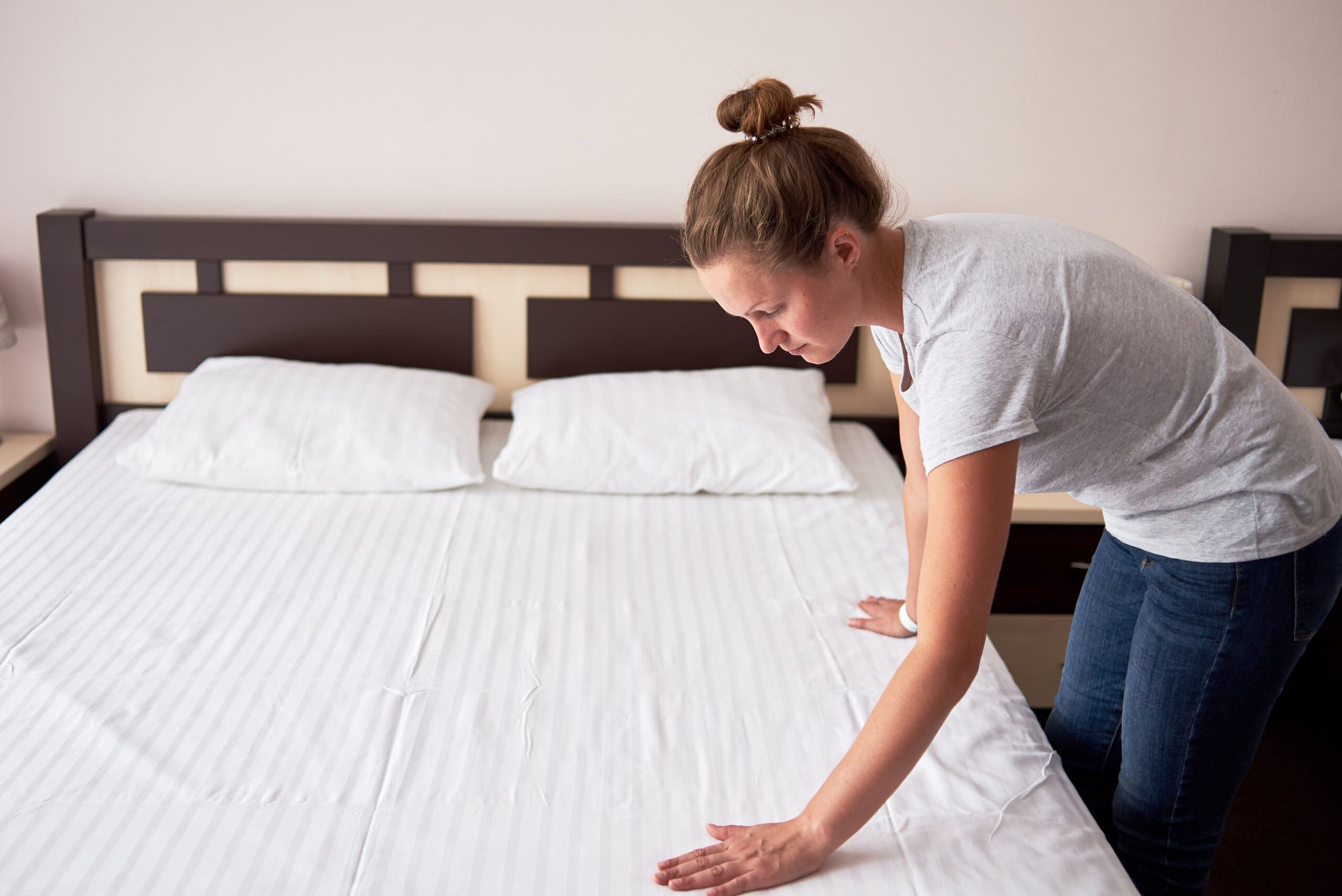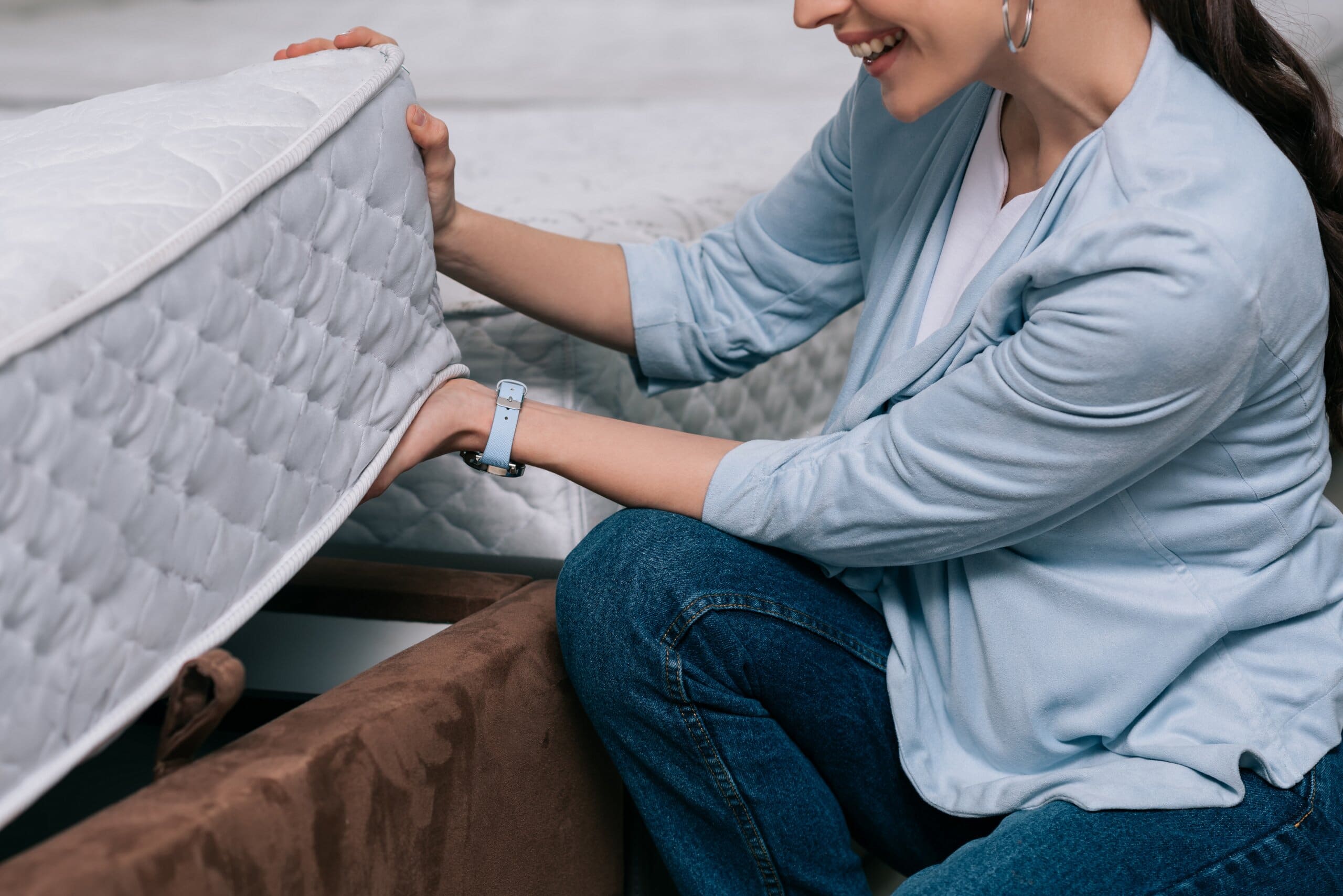Last updated: July 2025
How Long Does A Mattress Last?
Not sure if it's time for an upgrade? Here's how long a mattress tends to last.
Not sure if it's time for a mattress upgrade? Here's everything you need to know about how long mattresses tend to last.
When it comes to getting a good night’s rest, the last thing you want is a lumpy mattress at your back. Nor do you want to be tossing and turning to find that one comfortable spot left after years of continual use. But if you’re on a tight budget, you might be wondering if buying a new mattress is necessary, especially if you can still get some sleep at night.
Well, besides the fact that 'some' sleep is not a full night’s rest, the honest truth is that no mattress lasts forever. So, if you’re wondering what the average mattress life span is and how long you should use a mattress before replacing it, our guide is here to help.
From giving you a better idea of how long your mattress will last to how to spot the signs you might need a new one, we’ve covered it all below!

What is the average lifespan of a mattress?
According to the National Bed Federation, on average, you should consider replacing your mattress after 8 years. However, since mattresses vary so much, that's less of a rule and more of a guideline, and we'd generally say that 8-10 years in the lifespan of most mattress types.
However, if 8 years have passed and you feel like your mattress is starting to give out, then it may be time to start looking for a new one.
Should I replace my 20-year-old mattress?
If you’ve somehow managed to get to sleep on the same mattress for 20 years without complaining, then first, congratulations! You might just be the kind of person who can fall asleep anywhere...
Second, yes, now that 20 years have passed, you should absolutely change your mattress!
The only mattresses that last this long are Vispring mattresses, which come with a whopping 30-year guarantee. However, these are seriously luxurious mattresses on the very top of the quality scale, so you do have to pay for this privilege.
In terms of any other type of mattress, if you’re still using the same one after 20 years, it is absolutely time to swap it out for a new model, as most are not intended to last over a decade.
How do you know when you need a new mattress?
Given that there’s no definitive answer to the question of how often to replace a mattress, it’s instead better to keep an eye on your mattress as it approaches the 8-year mark and take note of any issues you may be having with it.
For example, the most common sign that you might need a bed upgrade is consistently feeling like you're getting poor-quality sleep, or that you sleep better in a hotel. This sort of sensation could be a result of your mattress losing its firmness and support, stopping you from getting proper rest.
At the end of the day, sleeping on a bed that isn't offering the essential spinal support you need tends to lead to stiff joints and uncomfortable back pain, making it all the more important to invest in a good mattress as you get older.
How do you know when you need a new mattress?
Looking for a full list of signs to look out for when it comes to mattress replacement? Here is our definitive list of core indicators to keep an eye on so you can tell when it’s time to trade in your old mattress for a new one:
- Constantly waking up feeling tired – this is the main red flag when it comes to mattress longevity and almost always indicates that it’s time to get rid of your old mattress.
- Aches in the morning – aches and pains in the morning are also crucial warning signs that your mattress may need swapping out and that your spine isn’t aligned properly while asleep.
- A hotel mattress feels better – if you ever stay overnight in a hotel and you get a better night’s sleep than you do at home, it could be a signal that your mattress back home is past its best-before date.
- Sagging mattress sides – if you put your weight on the side of the mattress when getting into or out of bed and the sides immediately sag, that’s a sign that the springs have lost their bounce and won’t give support for much longer.
- It smells musty – regularly airing and cleaning your mattress is essential for keeping your mattress in good condition. So, if it's starting to smell musty, or you find that your asthma or allergies are getting worse at night, it may be time for a new one.
- Lumps and bumps – if you rotate or flip your mattress every few months, and you’re still finding lumps, bumps, and dips, your mattress may have reached the end of its lifespan.


What affects a mattress' lifespan?
It goes without saying that there are many things that can determine how long your mattress will last, such as the quality of materials used in its construction and how you personally treat it, and you may find that you get more than 8 years out of your mattress compared to other sleepers.
Even the weight and sleeping style of the user can all influence a bed's longevity, but so too can the type or quality of mattress you own. Both memory foam and spring-based mattresses should last for about the same length of time, however, how a mattress is cared for will directly influence how long it stays feeling supportive for you.
Case and point, memory foam doesn’t have as much ‘bounce-back’ as steel springs. But springs tend to sag more over time and become lumpy and uneven. Memory foam can also develop dips if it’s not turned regularly, and spring mattresses can suffer from side sagging as the years go on.
Naturally, keeping your mattress clean and well-aired will prolong its life. But the biggest thing that can help is to ensure that you rotate or flip your mattress regularly to allow overused areas to recover their support.
What type of mattress lasts the longest?
Much like the specifics of how many years a mattress can last before needing to be replaced, no one type of mattress is guaranteed to last longer than another. But with that being said, certain mattress materials certainly have a longer lifespan than others.
Take a look at how long different types of mattresses typically last, below:
How long does a spring mattress last?
In almost all cases, pocket-sprung mattresses tend to last longer than traditional spring styles, while traditional springs, also known as open coil, fall at the lower end of the average mattress life span of around seven years.
How long should a memory foam mattress last?
In most cases, a memory foam mattress lasts as long as any other style of mattress – roughly seven or eight years. However, premium memory foam styles have been known to last between eight to ten years, which is slightly above average.
How long does a latex mattress last?
As comfortable as a latex mattress can be, because latex is a naturally found material, it will eventually break down over time.
But don't worry, it's not going to start crumbling before your eyes after a few years, and natural latex mattresses typically have a longer life span than other styles, often between ten and twelve years depending on the quality of the materials and the care taken to preserve them.
Latex styles are the most environmentally friendly out of all the mattresses, so when they do eventually need replacing, they won't leave behind a nasty carbon footprint. Our latex mattress guide can give you more information.
How long does a cot mattress last?
Babies and toddlers tend to use a cot or cot bed mattress for a maximum of five years before they need to move on to the next children's bed size up. Because of this, cot mattresses are only designed to last as long as a maximum.
This short mattress life span only becomes a real problem when cot mattresses are re-used for multiple babies. Once it has begun to dip and sag, it's no longer providing the correct support which is especially important for babies and young children. This is just one reason why you shouldn't consider a second-hand mattress, with your little one's safety coming absolutely first.


How to take care of your mattress and make it last longer
While your mattress will need to be replaced one day, there are certain things you can do to prevent it from deteriorating faster. If you want to extend how long yours will last, try and follow these key care tips below:
1. Protection is better than prevention
Using a mattress protector from the beginning with help to preserve the inner materials of your mattress. For example, water damage might not be at the front of your mind, but this doesn't just occur from urine stains from bed-wetting and spilt morning coffees. Getting blood out of a mattress can be tricky, and no-one wants to sleep on a soiled mattress, so make sure you're protecting your sleeping environment.
Plus, we all sweat during the night, and while it's not a noticebale amount each night, over time that small amount of liquid racks up and can cause the materials in your mattress to age and even rust, thus reducing the lifespan of your mattress.
2. Use a secure base
A bed frame that has seen better days can also affect a mattress's life span. After all, beds deteriorate too, and can bring a new mattress down with them that much sooner if you’re not careful.
If a divan base has started to bow or bed slats have begun breaking and falling through, it can start to affect the mattress structure. Fortunately, a good quality bed frame typically lasts longer than a mattress, so there's no need to replace the frame every time you need a new mattress.
Nevertheless, it's important to check what kind of shape your current bed frame is in before putting a new mattress on top.
3. No jumping on the bed!
This one might be quite obvious, but our parents were right when they told us not to jump on the bed. Mattresses are designed to evenly distribute weight, and putting lots of weight on one spot is an easy way to break it.
Also, if you want to take extra steps to improve the life span of your mattress, avoid sitting on the edge of the bed. The springs at the edge are often the weakest since they're not surrounded by more supporting springs, and over time, sitting on the edge will wear down the springs on that side and cause them to sag.
4. Rotate and flip your mattress regularly
Thanks to modern mattress technology, completely flipping mattresses over is becoming a thing of the past, as many modern mattresses are now one-sided and do not require flipping to keep their structure.
However, many brands recommend rotating your mattress 180 degrees every so often to ensure even wear all over. So, before flipping or rotating a mattress, be sure to check the instructions provided with your particular style to avoid damage.
5. Take care when cleaning
Finally, regular cleaning can help extend your mattress’s life span by reducing the build-up of skin cells, which may attract unwanted bed bugs if you’re not careful. But before giving your mattress a freshen-up, make sure to tailor your cleaning methods to its materials and structure.
As an example, pocket-sprung mattresses benefit from being vacuumed every three to six months, which can prevent dust mites in your bed, too. However, if you have a foam mattress, you should actually avoid vacuuming where possible and use a brush to clean it instead, as vacuuming foam can cause it to become misshapen and even tear.

How long do mattress protectors last?
Generally, mattress protectors last between one to two years, but you should replace them sooner if you notice any wear and tear. Naturally, overwashing, using a tumble dryer to dry them, and sleeping directly on the protector without a sheet will cause them to wear down faster, but you'll likely notice signs of bobbling and thinning of the material well in advance of it becoming unusable.
Does compression or settlement mean my mattress needs replacing?
It's important to understand the difference between a mattress 'sagging' and it 'moulding' to your body - which it's meant to do. Just like wearing a new pair of shoes, mattresses of any filling will learn to contour to your unique body shape and optimally support you by gently relaxing in key areas.
Your mattress typically learns how to support you after a few weeks of you sleeping on it, which is especially evident with memory foam mattresses, which may form a 'body impression'. But some fillings don't 'recover' (spring back to their original state) as quickly as others, for example, luxury natural materials or mattresses that use multiple layers of synthetic materials.
However, this is not necessarily a bad thing - as mentioned, this compression is due to the materials reacting to your body's needs. Mattresses will naturally 'settle' due to pressure from your body in order to best support and comfort you.
The extent of this compression is dependent on a variety of factors, such as weight, sleeping position, and sleeping duration. As you might expect, heavier people who sleep for longer hours will find their mattress moulds to their body faster than those of a lighter build.
You might also think that a good quality mattress would keep the same feeling months or years later as it did when you first bought it, but the truth is the exact opposite. A good mattress will mould to your natural curvature for maximum support and comfort.
Of course, if you feel your mattress is compressing beyond just moulding to your body, then it's a good idea to check with the manufacturer to ensure there's nothing else at play or causing a lack of support.

Find a long-lasting mattress in our range
For the most part, you shouldn’t have to worry about how often to replace a mattress as you'll likely want to try a different mattress type as your sleep needs change before you notice your current mattress has started to wear down. But if longevity is what you're looking for, it’s certainly wise to invest in your mattress from the start.
Remember, cheaper budget mattresses are usually made with less durable materials, and while their low price doesn't necessarily mean they will feel uncomfortable, they're not designed to withstand the test of time.
On the other hand, if you opt for an averagely priced mattress, you can expect it to last the average amount of time, with more expensive mattresses made from premium materials holding up even better in the long run.
But regardless of how much you’re looking to spend on a mattress, you can find a whole range of luxury and affordable options in our range. You can even use our simple MattressFinder™ quiz to pair you up with some perfect picks for you to consider!

